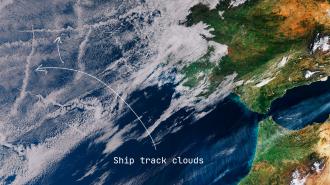Scientists suspect that a major cut in air pollution from the shipping industry is contributing to faster ocean warming — but there may be a silver lining.
The background: In 2020, the United Nations’ International Maritime Organization (IMO) slashed the amount of sulfur that’s allowed in ship fuel. This was expected to reduce harmful sulfur oxide emissions from ships by 77%, with major benefits to human health and the environment.
“[R]eductions in stroke, asthma, lung cancer, cardiovascular, and pulmonary diseases are expected,” wrote the IMO. “Cutting sulfur emissions from ships will also help prevent acid rain and ocean acidification, benefitting crops, forests, and aquatic species.”
The reduction in sunlight-reflecting “ship tracks” may be helping fuel unprecedented ocean warming.
The impact: As expected, the amount of sulfur pollution from the maritime industry plummeted after the rule went into effect — in January 2021, the IMO reported a 70% reduction in sulfur oxide emissions from shipping.
A NASA study, published in October 2022, corroborated the impact. Based on global satellite images, the regulation (and, to a lesser extent, the disruption of shipping during the COVID-19 pandemic) led to a significant reduction in the density of “ship tracks,” the linear clouds that form around aerosols in a ship’s exhaust.
While this is all good news for global air quality, ship track clouds reflect sunlight, and some scientists believe the sudden decrease in these artificially made clouds may be helping fuel unprecedented ocean warming.
Looking ahead: More research is needed to determine to what extent, if any, the reduction in ship tracks is contributing to ocean warming — other factors, such as El Nino, weakening ocean winds, and the overall trend of global warming, likely deserve at least part of the blame.
“I don’t know how big the effect is,” Leon Simons, a climate researcher in the Netherlands, told the Washington Post. “I hope it’s small. I hope all this data is deceiving me. I don’t think so.”
Marine cloud brightening could potentially ensure we don’t sacrifice our oceans in pursuit of cleaner air.
The bright side: If the widespread reduction in ship tracks is responsible for some of the recent rise in ocean warming, it suggests we might be able to cool the ocean significantly by increasing cloud cover over it.
This could be done through marine cloud brightening, a geoengineering technique where a mist of seawater is sprayed into the air from boats. The salt particles in the water then make the clouds thicker and more reflective, just like the aerosols in ship exhaust, but without harming human health.
The technique has only been tested in small studies, and we don’t know whether it might have its own unintended consequences, but compared to other geoengineering proposals, it’s fairly low risk and could ensure we don’t sacrifice our oceans in pursuit of cleaner air.
We’d love to hear from you! If you have a comment about this article or if you have a tip for a future Freethink story, please email us at [email protected].






